Manuscripts and Materiality of Text
发布时间:2018-01-05Summary of The Second Biannual Graduate Student and Young Scholars Workshop “Manuscripts and Materiality of Text”
International Center for the Study of Ancient Text Cultures
RenminUniversity of China
January 5-13, 2018
Shaanxi Normal University, Xi’an, China
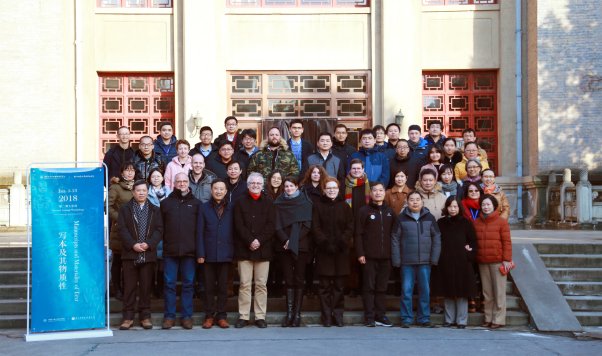
OnJanuary5-13, 2018, the International Center for the Study of Ancient Text Cultures (Renmin University of China),together with the School of Liberal Arts of Shaanxi Normal University, hosted the Second Biannual Graduate Student and Young Scholars Workshop on the topic“Manuscripts and Materiality of Text” inXi’an, China. Four distinguished professors from the fields of ancient and medieval Chinese, ancient Mediterranean, and medieval Latinmanuscript studies presented day-long lectures in English or Chinese with simultaneous translation.
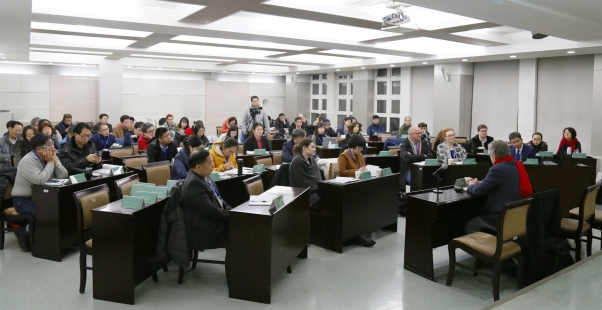
The workshop opened with a special address from the Director of the Center at Renmin University of China, Professor Martin Kern (Princeton University). After expressing his thanks to the hosts, organizers, and volunteer team, Kernelaboratedon a methodological standard for manuscript studies across the area disciplines. First, Kern drew attention to areas of possible confusion between analytic categories: he highlighted thatscribal competence must be distinguished from textual competence (and vice versa), and that codicological breaks do not necessarily demarcate textual units (and vice versa.) Kern further critiqued erroneous teleologicalforms of reasoning within textual criticism—sometimes based on assumptions derived from tradition—and explained how such circular reasoning is often motivated by adesire to establish ever-more ancient dates for particular texts. Kern also pointed to instances wherebyextrinsic concerns or influences are brought to bear on (or at least, become problematically entangled with) the work in manuscript studies. In this context, taking the Chinese case as an example, heexpressed his concerns over the politics and problems involved in the acquisition and authentication of looted manuscripts. Overall, Kern used his address to urge all participants towards the highest standards of analytical precision and meticulousness. Many of the broad methodological concerns raised in his talkre-emerged as leitmotifsthroughout thevarious talks of the week-long program.
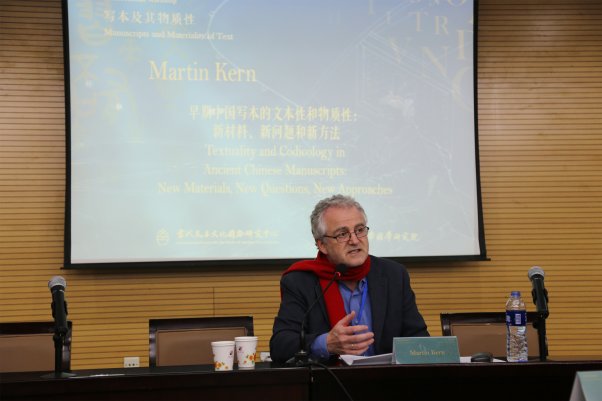
Professor Martin Kern (Princeton University)
On the first day of lectures, Professor Matthias Richter (University of Colorado) led the discussion onancient Chinese manuscript texts. Richter reviewed the core terminologies and categories of this work, considering how the idea of “manuscript studies” intersects with the fields of palaeography, codicology, and so forth. This laid the ground fora discussionofthe anatomy of the text in relation to the manuscript as its material carrier:Richter described a modelwherein the abstracted “mental” text is materialized (as a manuscript) through processes of encoding and decoding. These encoding/decoding processes refer to the negotiationof variouscompounded semiotic fields (text layout, orthography, script style, stationery choice) by a human agent (scribe, reader, author).Richter further demonstrated his approach in textual criticism through a series of close and highly illuminating manuscript readings where he focused on one particular encoding/decoding mechanism: punctuation. As Richter showed, a detailed and unprejudiced reading of a newly discovered manuscript, if taken seriously in all its textual and codicological dimensions, allows us to rethink the received textual tradition, especially in cases such as the Laozi where multiple manuscripts can be compared with the transmitted counterpart of the text.
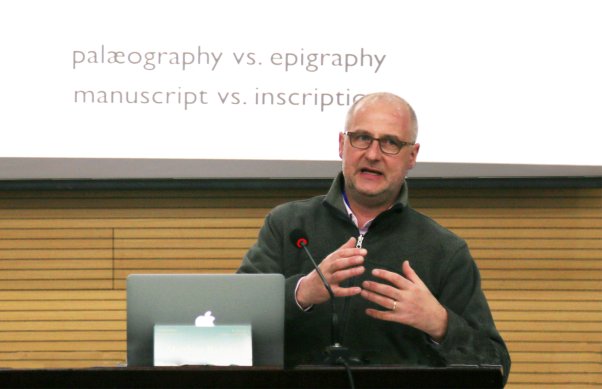
Professor Matthias Richter (University of Colorado)
On the second day of lectures, Professor XUJianping许建平(Zhejiang University) took the workshop several centuries forward and several hundreds of miles west to discuss the Dunhuang manuscript cache of medieval China. As Professor XU highlighted, the practical and methodological considerations ofDunhuang manuscript research differ considerably from those of early Chinese manuscript studies.The Dunhuang cache was discovered at the turn of the twentieth century in a well-attested event, and the manuscripts have long since percolated through prestigious international collections, where they have been extensively deciphered, preserved, and digitized.Xu first presented a bibliography of Dunhuang texts, text-fragment reproductions, and academic studies, divided as these are between collections across the globe. He then turned to the study of the manuscripts themselves, particularly looking at material factors such as the formation of handwritten characters.
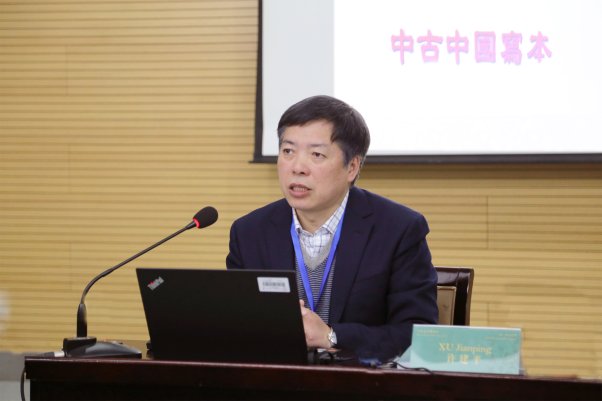
Professor XUJianping (Zhejiang University)
On day three, Professor AnneMarieLuijendijk(Princeton University) gave a comprehensive introduction to the field of papyrologyin Mediterranean antiquity. Referring to her work on caches of Greek papyri excavated at Oxyrhynchus (early Christian texts in particular),Luijendijk’s presentation formed a thorough exposition of the material lifecycle of a papyrus, from its production through to its distribution and use, and, finally, disposal. Luijendijk’s presentation was greatly enriched by the addition of real(modern) papyri specimens, which participants were invited to handle. It was in this tactile context that Luijendijk led a lively discussion about the relationship between material factors and text use – economy of materials, the profiles and needs of text users, hand and script –which revealed fascinating parallels and divergences with Chinese traditions. Discussing the archaeology of papyri disposal, Luijendijk introduced the methods of “garbology,” where applications for the study early text cultures represent a very recent innovation. Finally, she introduced two extremely useful online resources for accessing digitized papyri and papyri fragments.
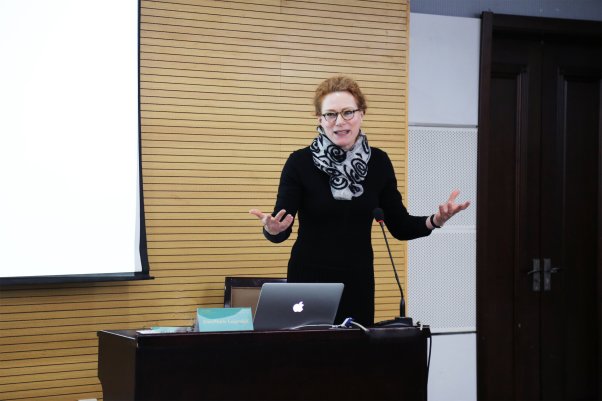
Professor AnneMarieLuijendijk (Princeton University)
On the fourth and final seminar day, Professor Daniela Mairhofer(Princeton University) discussed the study of Latin codex manuscripts from medieval Europe. Professor Mairhoferbegan the session by outlining the historical, social, and religious contexts of these manuscripts, situating them in the monastery networks of medieval Europe. As with Luijendijk’s seminar, Mairhofer led a substantial, engaging session on the material lifecycle of these manuscripts, exploring the archaeology of parchment stationeriesand the book structure (codex).Mirroring earlier discussions surrounding the Dunhuang manuscripts,the discussion led to the relationship between the manuscripts and scribes’ literacy, language competency, and penmanship. As Mairhofer showed, the medieval Latin manuscript industry must be understood in the context of European monastic scholarship. She further introduced specific aspects of the material script, including orthography and punctuation, layout, glossing, and marginalia, illumination and illustration, and script and hand, reflecting on how these elements related to the real socio-religious context of medieval manuscript production, use, travel, and storage. Mairhofer’s presentationrevealed that only by taking into account these various factorscan one arrive at a full reconstruction of a manuscript text.
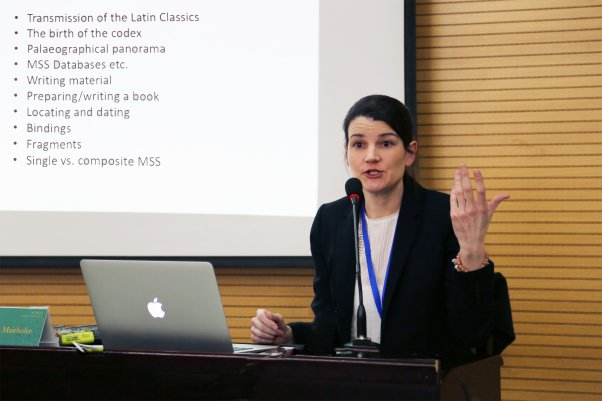
Professor Daniela Mairhofer (Princeton University)
The four full days of seminar sessions were followed by two days of excursions to sites of special archaeological interest around Xi’an, including the Han dynasty Yangling Mausoleum, the Qin First Emperor’s Terracotta Warriors, the Shaanxi Province History Museum, and the site of the Western Han imperial palace. During these excursions, expert guides provided rich commentary.The workshop concluded with a day of student presentations and group discussions led by the four professors, with student paper topics ranging fromdirect manuscript work to literary, historical, and material culture studies.
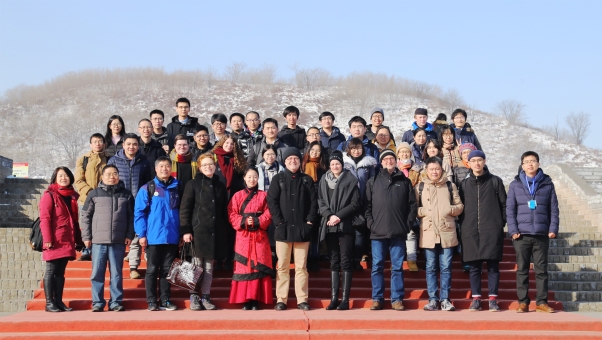
Archaeological Excursion to the Han dynasty Yangling Mausoleum
The International Center for the Study of Ancient Text Cultures will hold its Third Biannual Graduate Student and Young Scholars Workshop on June 13-18, 2018, in Beijing. This time, the topic will be “Ancient Historiography in Comparison,” with world-renowned experts teaching on Chinese, Greek and Roman, and ancient Jewish and Biblical historiography.
-Corina Smith, DPhil Oriental Studies, Pembroke College, University of Oxford